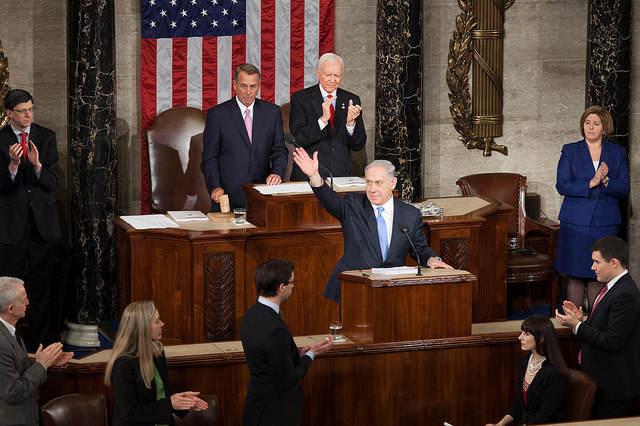by Paul R. Pillar
One of the strangest aspects of the frantic crying of alarm over Iran’s nuclear program—with the crying having reached its most publicized peak in Benjamin Netanyahu’s Republican/Likud campaign rally in the House chamber—is that the chief crier is the government of a country that not only has the most advanced nuclear program in the Middle East but has kept that program completely out of the reach and scrutiny of any international control and inspection regime. It is hard to think of a better example in international politics of the pot calling the kettle black, and in this case the pot is much blacker than the kettle—and was so even before Iran put its program under the unprecedented restrictions and intrusive inspections to which it agreed more than a year ago in negotiations with the United States and the rest of the P5+1. As for any military dimensions (the focus, of course, of all that crying when it comes to Iran), although neither Israel nor the United States says publicly that Israel has nuclear weapons, just about everyone else on the planet who says anything on the subject takes it as a given that it does, and that it has a fairly sizable arsenal of such weapons.
The person outside government who has studied the Israeli nuclear program most extensively is Avner Cohen, an Israeli-born scholar currently based in the United States. Cohen has written two books on the subject, Israel and the Bomband The Worst-Kept Secret: Israel’s Bargain with the Bomb. He probably knows more than anyone outside the Israeli government about the Israeli program and the strategic thinking underlying it. It thus is especially interesting to hear what Cohen has to say about the current battle over the Iranian program. In a commentary just published in the Israeli newspaper Haaretz, Cohen writes about how, as I discussed the other day, the actions and lobbying of Benjamin Netanyahu are at odds with his own alarmist rhetoric, and about what this implies concerning Netanyahu’s motivations.
Cohen criticizes Netanyahu’s drumbeat message that the agreement being negotiated would be very bad for Israel; he notes the “potential advantages” of the agreement, which is from the standpoint of Israel’s interests a “reasonable compromise.” He points out that the demand to prevent any Iranian enrichment of uranium will never be realized, and that the demand has no basis in the Nuclear Nonproliferation Treaty.
Cohen goes on to state that the emerging agreement “also contains unique advantages barely discussed in Israel. It clearly distances Iran from a nuclear bomb—from a few weeks as was the case in 2012 to about a year. Most importantly, it establishes a regime of safeguards and transparency for almost a generation.”
Cohen concludes by pointedly describing what Netanyahu’s scaremongering efforts are really all about, which have to do with Netanyahu having made such alarmism his political signature music, on which he relies both to maintain political power in Israel and to rationalize his policies to the outside world:
“Despite its flaws, the proposed agreement is far from bad for Israel—the only nuclear power in the Middle East—but it is very bad for Netanyahu. The agreement offers Israel almost a generation, or even more if it succeeds, in which Netanyahu won’t be able to sow fear about Iran as an existential danger. It would leave Netanyahu as a leader whose raison d’être has been taken away from him.”
Netanyahu’s narrowly-motivated efforts to destroy the diplomacy with Iran are not only directly contrary to U.S. interests; they also are contrary to Israel’s interests. Those who really do care about Israel and its security, rather than just ritualistically referring to them while swaying and bobbing up and down to Netanyahu’s music, need to realize that.
This article was first published by The National Interest and was reprinted here with permission. Copyright The National Interest.






Bibi needs the Iran bomb threat to justify his stalling on the Palestinian issue. If that threat is removed then Israel’s survival would not be at stake anymore. It is probably Obama’s intention if the Iran deal is signed to start pressing Israel on an Israel-Arab peace deal. That’s what Bibi wants to stop by claiming that Israel will be in danger. Yes, it would but the danger is of a having to make huge compromises about the Palestinians.
Just campaigning for the vote
Interesting post. How about this: Netanyahoos adventure with the U.S.Congress Republicon side, is a prelude to his entering the Repuglicon primary’s for P.O.T.U.S., if he should lose being reelected in Israel? After all, he does have dual U.S. & Israeli citizenship, doesn’t he? Why I’m sure Adelson would pour his $billions into the campaign, or maybe not?
Was he born in the US? He is not qualified to be President otherwise.
Actually, I believe he was born in Poland, under another name, which he changed when he came to the U.S. for education. Anyway, he’s supposed to have duel citizenship, and knowing the machination[s] of the Congress, along with the bribes they take from the lobbyists, don’t bet the farm that it couldn’t happen. We’ve already seen how many butt bumps he got for his “KABUKI” performance Tuesday.